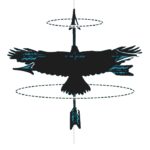My world hung from the roots of a black walnut in our farmyard. As a kid I never dug up those roots. I feared the world might spin out of orbit, out to chase after stars that came and went as parents came and went. I knew it well, that if the hardwood walnut wasn’t there to hold it firm in place, this world of ours had an inclination to weave toward the sun, to circle the moon.
When Graham’s girlfriend, however, giggled and gushed ‘walnut wood makes for a restful sleep,’ Mother no longer saw need of a durable tree. Down with the walnut, she cried.
I cried, I raked its yellow leaves, I wished dead, dreadful things on Graham’s Girl and I waited for the lumberman, his axe and checkered shirt.
I piled the yellow leaves high under the boughs of my black walnut, then crawled inside. The light changed from farmyard fallow to cream. Leaves divided the outside into manageable portions: a few chimney bricks, the tyres of a Toyota, the neon rope Graham had used to make me a swing. Sap strung the leaves to my hair and I sat uncomfortable, worried about ant’s nests and black widows. But I remained beneath my black walnut and together we waited, we watched, we wished the lumberman and Graham’s girl dead, dreadful things. When the lumberman appeared we dug our roots in all that firmer.
Mother whipped out of the back door. The folds of her skirt snapped like my walnut’s leaves in an autumn storm, and the chickens were sent flapping. Instead of bouncing in its frame, the screen door whipped out the lumberman, with his axe, with his untucked, checkered shirt. They marched toward the black walnut.
‘This one here,’ mother brandished a cigarette at the tree.
‘And the wood? Walnut makes good furniture.’
‘Graham’s girl can say what she likes, this farm’s still in my name. The tree goes. Take the wood, sell it. Make sure it’s gone before they turn up again.’
‘And Tammy?’
‘Girl’s still young. All this nonsense about trees. At her age, I had my eye on boys, not on bark.’ Flicking the tip of her cigarette, ash spread over the roots. ‘If you see the girl, send her in. Graham’s coming round later to pick her up.’
The lumberman tucked in his shirt then set to work. First he hacked a wedge from the trunk, then tossing it aside, he swung his axe, back and forward, into the opening. Mother, now calm, put her cigarette out on a root. Skirt snapping, she returned to the house. My black walnut shuddered with each thud from the lumberman’s axe. Outside my pile of leaves the world was a series of swings and thuds. I wished mother, the lumberman and Graham’s girl dead, dreadful things as I tasted sap in the air and feared the consequence of a world without a tether.
‘What’s this-wait… but that’s Tammy’s tree!’ Graham materialised in one of the peep holes from my pile of leaves. I spied his girl a metre behind, crawling across the farmyard like an engorged stick insect. Mother and I shared an urge to stamp on her and her existence. Under my boot she would be a pale, insect green. A smudge.
Mother snapped out of a blind spot, ‘Don’t know that you have anything to say here, bringing a skinny thing like her onto my farm.’
‘You’re felling Tammy’s tree?’
‘My tree. Take your daughter and get off my property.’
The lumberman’s axe perforated the sentence. Daughter fell out of my mother’s mouth in two halves.
‘Tammy won’t thank you for this later,’ Graham walked toward the lumberman.
‘But she’ll thank you?’
‘Give me that axe!’
Graham grabbed for the axe, but the lumberman, whose arms bulged thick as the walnut’s trunk, refused to let go. Mother proceeded to beat both with her bony fists, while Graham’s Girl and I watched, and waited, and wished them dead, dreadful things, before, with a splintering crack, my black walnut sprayed us all with wood splinters as it swung on its broken spine. The grown-ups looked up as the black walnut came down. Then the walnut in a swinging roar folded them into autumn. The grown-ups crumpled like leaves, like walnut shells.
Graham’s girl squealed, and skittered across the yard toward the cars.
I burst out of my pile. Leaves rushed around me. My world had hung from the roots of that black walnut. The roots now looked up, tickling the sky and the world, in its freedom, swung out of orbit.
—
Louise Lannink grew up in the Yarra Valley, Australia. She later studied English and Philosophy at the University of Graz, Austria, and currently lives in the foothills of the Swiss Alps.
Photo by: Ana Prundaru
